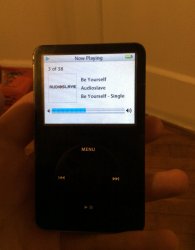No, I don't have a 'hang-up' about the click wheel, although I do like it as a design. I do have a 'hang-up' about my desire to have a very nice device which can play music and is large enough to hold my entire (rather large) music library.
However, I don't delude myself - and am perfectly aware that I am pretty much in a minority where my musical needs and personal preferences are concerned. Evolution, and all that. And, Apple being the business that it is, the company has no regrets whatsoever destroying, or discontinuing (I even spotted the very verb 'murder' used in this context earlier this evening) a product it no longer deems sufficiently profitable.
I bought my first iPod - of any description - it was, of course, the classic - in early 2006. I was due to head to Belarus to observe an election, a process which would have (as it did) left me in a country where (politically active and less politically active) people could or would be arrested merely for talking with you (which actually happened) - in other words, it promised to be a socially strained few months, the sort of 'socially strained' environment which even I, as something of an introvert, knew would be quite challenging.
Hence, two days before my departure, the purchase of an iPod, which was to be my boon companion for the next few months. In fact, I have never since travelled abroad - and I travel a lot - both professionally and because I like travelling - without an iPod classic and a nice set of headphones in my rucksack or briefcase.
Now, in those days, I had a Windows computer - my old Toshiba Satellite Pro, which was later upgraded for a Sony Vaio. Both were perfectly fine computers, and, when I bought the iPod, I had no thought of changing, or, 'switching' (to Apple) as the parlance has it.
Fast forward to a dead iPod - some few months later. For, while I am something of a devotee of the iPod classic line, I am not blind to their shortcomings, and one serious shortcoming was a small - but consistent - percentage of HDD failures in the classic line. Mine was one of those, and the response of the Apple team in the shop where I bought it - it was still under warranty - where the iPod was simply taken from me, on production of a receipt, accepted, and - a few weeks later - a replacement arrived, a manner of doing business which impressed me.
Some years later, another iPod classic - which also died, also still under warranty - was replaced without a murmur, and without seeking refuge in contractual small print, footnotes, or subclauses.
This service, more than the delightful companionship of the iPod gave rise to what Apple - and other - marketing types later came to describe as the 'halo' effect. At the time, Apple designed gorgeous products, but they were very much a niche market and a niche player.
The iPod (and later, the iPhone) changed all that, by introducing individuals - among whom I count myself - who would never have done more than taken a sideways glance at the company and would never, ever have contemplated a purchase, or a switch, to this alien if attractive alternative universe, without the positive experience engendered both by the product - the iPod classic - and the excellent after sales service which attended upon the product committing suicide and being replaced without the usual hassle that would have been experienced with the products of many - not all - other companies.
All of this gave rise to the 'halo' effect, which meant that by the time I was contemplating replacing my Sony with another laptop computer, I was prepared to contemplate 'switching' to Apple, something which would never even have been a consideration but for my positive experience with the iPod classic.
So, it wasn't just that the iPod classic utterly transformed the way music was consumed and offered a new marketing model in the process (and, indeed, broke the stranglehold of the major music companies by so doing), and nor was it that it served to pave the way for the iPhone and attendant technologies, it was also that the iPod classic served - via the 'halo' effect - to introduce large new numbers of individuals to the whole computing - and other - world of Apple.
That is not to say that the Apple executives do not consider it obsolete; they do, unfortunately. Of course, there is still a demand for it, but - obviously - it is a small, steady (articulate) - and relatively unprofitable demand. Such is life, and change, but this is one change, which I, for one, deeply regret.


